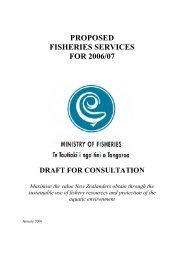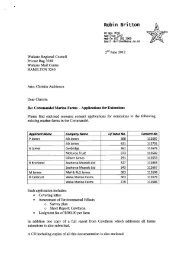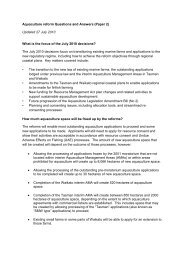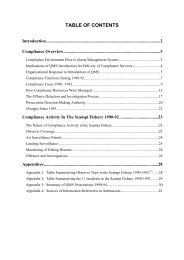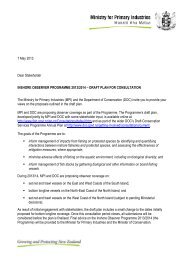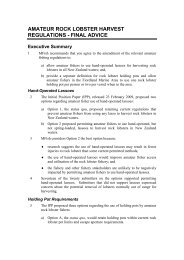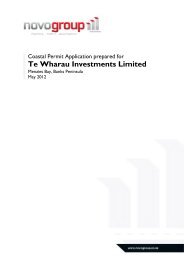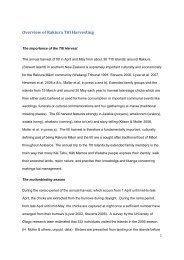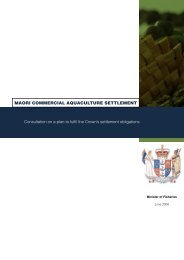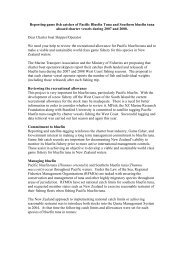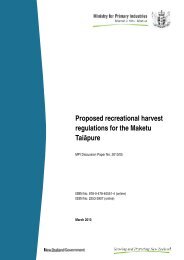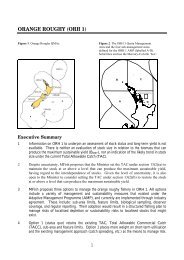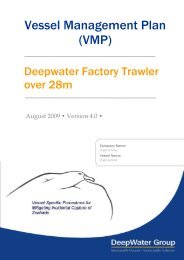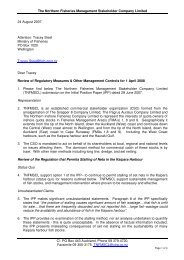Meet the Ministrys new Chief Executive - Ministry of Fisheries
Meet the Ministrys new Chief Executive - Ministry of Fisheries
Meet the Ministrys new Chief Executive - Ministry of Fisheries
You also want an ePaper? Increase the reach of your titles
YUMPU automatically turns print PDFs into web optimized ePapers that Google loves.
4 TheBite APRIL 2008<br />
The observer programme usually arranges <strong>the</strong> trips before<br />
<strong>the</strong> observer arrives at a fishing vessel, but <strong>the</strong> task <strong>of</strong> getting<br />
onto <strong>the</strong> small commercial boats can fall to <strong>the</strong> observer.<br />
With smaller boats, <strong>the</strong> observer’s negotiating skills with <strong>the</strong><br />
skipper is important, particularly when <strong>the</strong>re are difficulties<br />
finding out which boats are active at any time and place. If all<br />
<strong>the</strong> polite approaches fail <strong>the</strong>n <strong>the</strong> observer programme has<br />
to turn to <strong>the</strong> <strong>Fisheries</strong> Act to get <strong>the</strong> observer onboard.<br />
COLLECTINg SCIENTIFIC INFORMaTION aNd SaMPLES IS ONE OF<br />
OBSERVERS’ kEy ROLES. THE LaRgEST EXaMPLE OF a COLOSSaL<br />
SqUId CaUgHT IN THE ROSS SEa WaS ONE OF THE MORE<br />
SPECTaCULaR SaMPLES RECORdEd By aN MFISH OBSERVER.<br />
“The good <strong>new</strong>s is that <strong>the</strong> stigma observers <strong>of</strong>ten received<br />
from inshore fishing operators, in particular, is now passing.<br />
They’re beginning to appreciate that we’re not <strong>the</strong>re to<br />
scrutinise <strong>the</strong>ir every move, we’re <strong>the</strong>re to safeguard <strong>the</strong> longterm<br />
viability <strong>of</strong> fisheries - and we have to ga<strong>the</strong>r statistics<br />
and facts to do that.<br />
“I think in general, fishermen respond to observations and<br />
care a lot more than <strong>the</strong>y get credit for. Some <strong>of</strong> <strong>the</strong> larger<br />
fishing companies have spent lots <strong>of</strong> money on improving<br />
seabird mitigation techniques, yet that kind <strong>of</strong> fact, largely<br />
goes under <strong>the</strong> radar.”<br />
hOW ThE PROGRAMME OPERATES<br />
Funded solely by levies from <strong>the</strong> commercial fishing industry,<br />
<strong>the</strong> programme operates as an independent programme,<br />
based at MFish head <strong>of</strong>fice.<br />
With just four observer <strong>of</strong>ficers managing all observers around<br />
<strong>the</strong> country, <strong>the</strong>re is a huge amount <strong>of</strong> logistical planning<br />
involved.<br />
“We operate on a knife-edge a lot <strong>of</strong> <strong>the</strong> time, just waiting<br />
to see what might happen next. It <strong>of</strong>ten comes down to<br />
requests for <strong>new</strong> information or <strong>the</strong> wea<strong>the</strong>r changing, so<br />
boat schedules <strong>the</strong>n change, which in turn impacts <strong>the</strong> timing<br />
for getting observers across <strong>the</strong> country and onboard boats.<br />
“It’s <strong>the</strong> constant juggle <strong>of</strong> logistics which makes managing<br />
<strong>the</strong> programme very complex.”<br />
“Just to get observers on our books, <strong>the</strong>y need to go through<br />
an intensive screening programme – looking at how <strong>the</strong>y’ll<br />
likely handle situations at sea, or difficult scenarios, etc –<br />
because <strong>the</strong>re’s nowhere to go once you’re at sea.<br />
“Once <strong>the</strong>y’re accepted, observers <strong>the</strong>n need to go through<br />
a training programme, be fully briefed before each trip, put on<br />
one boat or ano<strong>the</strong>r, be debriefed afterwards, have <strong>the</strong>ir data<br />
processed for analysing and so on.”<br />
WhO DOES IT AND WhAT’S ThE ATTRACTION?<br />
A lot <strong>of</strong> interest comes from university graduates because it’s<br />
a good next step for marine biology – providing experience<br />
at <strong>the</strong> coal-face.<br />
KEy FACTS<br />
• The observer programme is an independent<br />
programme funded by <strong>the</strong> commercial fishing industry.<br />
• The observer programme currently has 55 observers:<br />
45 male/10 female<br />
• Observer coverage for 07/08 targets 7462 sea days<br />
a year (note one 12 hour shift per person equals one<br />
sea day)<br />
• Observer coverage is <strong>of</strong>ten steered by stock<br />
monitoring or <strong>the</strong> request for more scientific data<br />
• Average inshore fishery trips range from 7-10 days or<br />
up to 35 days for deepwater trips<br />
• International trips can be as long as a couple <strong>of</strong><br />
months. One <strong>of</strong> <strong>the</strong> largest trips took place last year<br />
which saw a female observer at sea in <strong>the</strong> South<br />
Georgia area for 150 days<br />
• Observers can earn up to $290 per day depending on<br />
experience and level <strong>of</strong> work required



